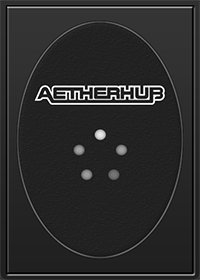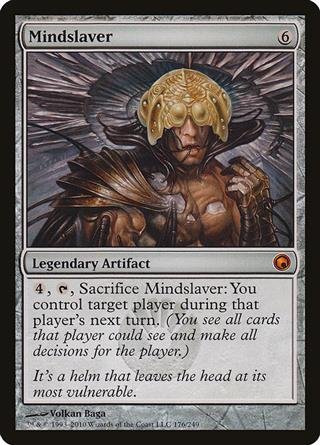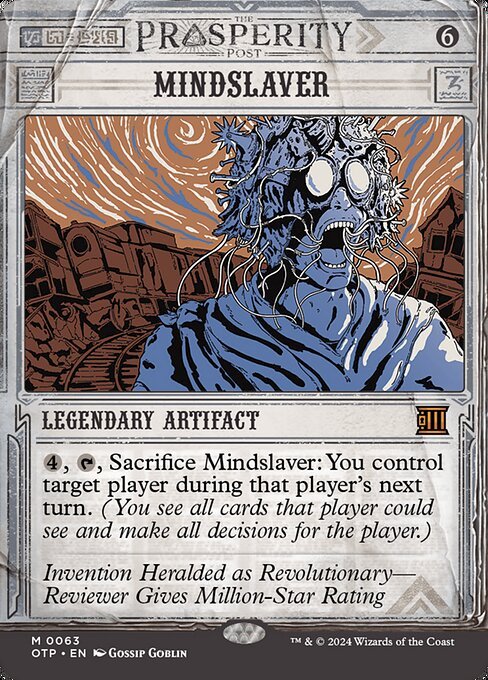
Mindslaver
Legendary Artifact
, , Sacrifice Mindslaver: You control target player during that player's next turn. (You see all cards that player could see and make all decisions for the player.)
Invention Heralded as Revolutionary—Reviewer Gives Million-Star Rating
|
Breaking News (OTP)
#80, Mythic Rare |
Illustrated by: Gossip Goblin
Not Legal Alchemy BO1
Not Legal Standard BO1
Not Legal Brawl
Not Legal Explorer BO1
Not Legal Pauper
Not Legal Pioneer
Not Legal Traditional Standard
Not Legal Traditional Alchemy
Not Legal Traditional Explorer
Rulings
- 2016-07-13
Controlling a player doesn’t allow you to look at that player’s sideboard. If an effect instructs that player to choose a card from outside the game, you can’t have that player choose any card. - 2016-07-13
While controlling another player, you can see all cards in the game that player can see. This includes cards in that player’s hand, face-down cards that player controls, and any cards in that player’s library the player may look at. - 2004-12-01
You could gain control of yourself using Mindslaver, but gaining control of yourself doesn’t really do anything. - 2004-12-01
You don’t control any of the other player’s permanents, spells, or abilities. - 2004-12-01
You can’t make the other player concede. A player can choose to concede at any time. - 2004-12-01
You get to make every decision the other player would have made during that turn. You can’t make any illegal decisions or illegal choices — you can’t do anything that player couldn’t do. You can spend mana in the player’s mana pool only on that player’s spells and abilities. The mana in your mana pool can be spent only on your spells and abilities. - 2004-12-01
You choose which spells the other player casts, and make all decisions as those spells are cast and when they resolve. For example, you choose the target for that player’s Shock, and what card that player gets with Diabolic Tutor. - 2004-12-01
You make all decisions for the other player’s triggered abilities, including what they target and any decisions made when they resolve. - 2004-12-01
You choose which creatures attack and how those attacking creatures assign their combat damage. - 2004-12-01
You also make choices for your own permanents, spells, and abilities as usual. - 2004-12-01
You can’t make any decisions that aren’t called for or allowed by the game rules, or by any cards, permanents, spells, abilities, and so on. - 2004-12-01
If you make another player cast Shahrazad, you don’t control that player in the subgame, but you continue to control them once the subgame is completed. - 2004-12-01
You choose which activated abilities the other player activates, and make all decisions as those abilities are activated and when they resolve. For example, you can have your opponent sacrifice their creatures to their Nantuko Husk or have your opponent’s Timberwatch Elf give your blocking creature +X/+X. - 2004-12-01
You control them for the entire turn, from the untap step to the cleanup step. - 2004-10-04
Only lets you make decisions that the player would actually make. If another effect allows another player to make decisions that would normally be made by that player, such as having another player decide how combat damage is dealt, then the other effect takes precedence.
| PRINTS | USD | EUR | Tix | |
|---|---|---|---|---|
|
|
$3.49 | €1.73 | 0.02 | |
|
|
$2.10 | €1.23 | 0.02 | |
|
|
$31.00 | |||
|
|
$1.32 | |||
|
|
USD Foil





